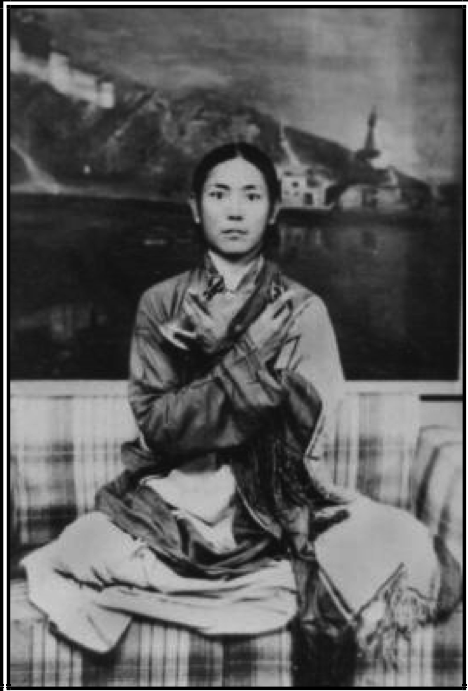Tulshuk Lingpa: Difference between revisions
Yeshedorje (talk | contribs) mNo edit summary |
Yeshedorje (talk | contribs) |
||
| Line 12: | Line 12: | ||
He move to India in his early twenties, lived and had monasteries in Himachal Pradesh, in India's western Himalayas. | He move to India in his early twenties, lived and had monasteries in Himachal Pradesh, in India's western Himalayas. | ||
==His Attempt | ==His Attempt to Open a Beyul== | ||
In the early 1960s, Tulshuk Lingpa came from Tibet to the then independent Kingdom of Sikkim in the Eastern Himalayas—sandwiched between Nepal, Bhutan, Tibet, and Indian Bengal—in order to ‘open the way’ to a hidden valley of immortality fabled in Tibetan tradition. | In the early 1960s, Tulshuk Lingpa came from Tibet to the then independent Kingdom of Sikkim in the Eastern Himalayas—sandwiched between Nepal, Bhutan, Tibet, and Indian Bengal—in order to ‘open the way’ to a hidden valley of immortality fabled in Tibetan tradition. | ||
After receiving visions that indicated he was to open the hidden valley in Sikkim, Beyul Demoshong, he went to Sikkim with 300 followers. | After receiving visions that indicated he was to open the hidden valley in Sikkim, Beyul Demoshong, he went to Sikkim with 300 followers. | ||
Revision as of 21:40, 21 April 2014

Tulkshuk Lingpa was a charismatic and learned terton, and a student of Dudjom Rinpoche. His name means 'Crazy Treasure Revealer'.
His Birth
Tulkshuk Lingpa was born in the Golok region of eastern Tibet with the name Senge Dorje.
His father was Kyechok Lingpa, a lama at the Domang Monastery in eastern Tibet. His fatherwas forced by the invading Chinese to flee over the Himalayas to India with his wife, Kilo. Kyechok Lingpa then had a monastery in Patanam, a few days' march from Tulshuk Lingpa's monastery in Simoling, Lahaul, until he died.
His Activity in Tibet and India
Tulkshuk Lingpa was recognised as a terton by Dorje Dechen Lingpa (also know as the Domang Tulku) at the Domang Gompa in eastern Tibet. Dorje Dechen Lingpa made an attempt to open Beyul Demoshong in 1920's, which failed. He died on his return journey.
He move to India in his early twenties, lived and had monasteries in Himachal Pradesh, in India's western Himalayas.
His Attempt to Open a Beyul
In the early 1960s, Tulshuk Lingpa came from Tibet to the then independent Kingdom of Sikkim in the Eastern Himalayas—sandwiched between Nepal, Bhutan, Tibet, and Indian Bengal—in order to ‘open the way’ to a hidden valley of immortality fabled in Tibetan tradition. After receiving visions that indicated he was to open the hidden valley in Sikkim, Beyul Demoshong, he went to Sikkim with 300 followers.
His Main Students
- Géshipa, once the rainmaker for the king of Buthan
- Lama Tashi, from Simoling, he was the umzay, or head of rituals, at Tulshuk Lingpa's monastery in Simoling, Lahaul.
- Lobsang, a close disciple and a very learned lama
- Mipam, a close disciple and learned lama. Originally from Lahaul, and a great practitioner of Chöd, he now leaves in deep retreat in a cave in Bhutan
- Namdrol, one of Tulshuk Lingpa's closest and most learned lama disciples. He was the one to hand-copy the texts that Tulshuk Lingpa wrote or received as terma.
Tulkshuk Lingpa was also close to Tarthang Tulku.
His Family Lineage
With his first wife Phuntsok Choeden (she was from central Tibet and came very young with him to India at a young age), he had several childrens:
- Sangyum Kamala, his eldest daughter, wife of Chatral Rinpoche
- Kunsang, his only son, also known as Dungsey Rinpoche
With his Khandro, or consort, Chimi Wangmo, from the village of Koksar in Lahaul, he had one daughter: Pema Choekyi. She was born shortly before Tulshuk Lingpa went into the snow mountains to open Beyul Demoshong. Her son is Gyurme.
Further Reading
- Thomas K. Shor, 'A Step Away from Paradise: The true story of a Tibetan Lama’s journey to a Land of Immortality'